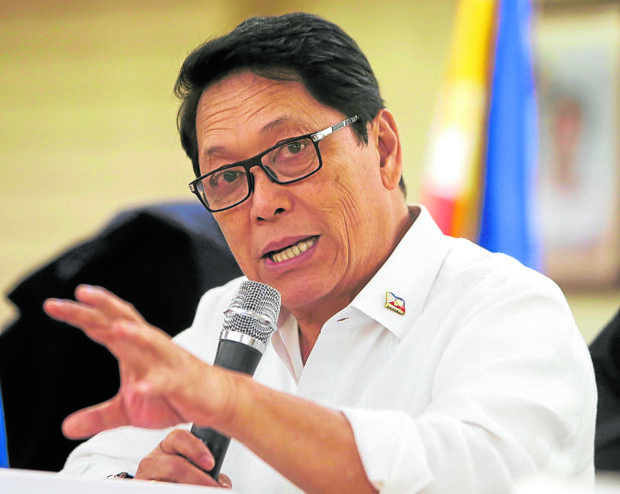OFWs safe amid China-Taiwan row – Meco chief
MANILA, Philippines — Overseas Filipino workers (OFWs) in Taiwan and their families need not be alarmed by Chinese Ambassador Huang Xilian’s remarks regarding their welfare as a result of the expansion of the Enhanced Defense Cooperation Agreement (Edca) with the United States, Manila Economic and Cultural Office (Meco) chair Silvestre Bello III said on Monday.
“I would like to assure you that the condition of our OFWs here in Taiwan is very good. There is no cause for alarm. I would be the first one to tell you if there is an emergency situation, but right now there is no tension. It is very normal in Taiwan now. All our Filipino community members are prepared for any exigency,” Bello said in an interview on cable news channel ANC.
Meco is the representative office of the Philippines in Taiwan that functions as a de facto embassy in the absence of diplomatic relations between Manila and Taipei.
“We have almost 200,000 OFWs in Taiwan, and their welfare and interest there are all well-protected,” he added.
Still, senators on Monday reminded the government to be on its toes to ensure the welfare and safety of Filipino migrant workers in Taiwan.
Sen. Francis Tolentino, vice chair of the Senate foreign relations committee, said the appropriate state agencies must be ready in case the OFWs needed to leave the self-ruled island nation that China claims to be its own.
“We have to prepare a contingency plan utilizing commercial vessels assisted by the Philippine Navy and Coast Guard,” Tolentino told the Inquirer.
“I already recommended that in case of emergency needing the immediate evacuation, civilian commercial passenger ships should be commandeered by the government to facilitate the immediate evacuation of our OFWs from Taiwan to northern Luzon,” he said.
Senate Minority Leader Aquilino Pimentel III added that the government must be prepared to act at all times since taking care of the OFWs was “supposed to be the front and center of our foreign policy.”
Senate Majority Leader Joel Villanueva said the relevant government agencies should be “proactive” in assisting OFWs in Taiwan.
Sen. Jinggoy Estrada, chair of the Senate labor, employment and human resources development committee, noted that P10.6 billion, or more than 60 percent of the Department of Migrant Workers’ (DMW) budget for 2023, had been allotted for the welfare services of the Overseas Workers Welfare Administration, or enough to bankroll the repatriation of the OFWs from Taiwan.
No Edca link
Reacting to Huang’s statement, Bello said that he did not see any relation between the welfare and protection of the OFWs in Taiwan and the designation of additional Edca sites in the Philippines.
“Whether the Edca sites are there or not, the fact is China has been trying to get back Taiwan. I don’t see the relation,” he said.
Bello was sought to comment on Huang’s remarks during the 8th Manila Forum of the Association for Philippines-China Understanding on Friday, where the Chinese envoy “advised” the Philippines “to unequivocally oppose ‘Taiwan independence’ rather than stoking the fire by offering the [US] access to the military bases near the Taiwan Strait if you care genuinely about the 150,000 OFWs.”
Bello stressed that China has no control over the employment of OFWs in Taiwan, saying the latter acts independently in hiring foreign workers.
“[Taiwan is] very independent. China definitely has nothing to do with the employment of our [OFWs],” he said, noting that Taiwan was in fact looking at hiring more Filipino workers.
According to Bello, Taiwan’s Ministry of Labor is coordinating with the DMW to hire more Filipino teachers and hospitality workers, as well as fishermen and farmers.
Bello also asked why China was now calling out Manila for expanding US troops’ access to Philippine military sites, while there were also other Edca areas across Asia.
Addressing fears
In Batanes, the military presented its plan detailing its preparations for the island province in case of a China-Taiwan conflict.
Officials from the military’s Tarlac-based Northern Luzon Command led by its deputy commander, Commodore Karl Decapia, traveled to Batanes, located some 148 kilometers (80 nautical miles) from Taiwan’s southern tip, to ease fears and address the lingering questions of the locals about the potential Taiwan crisis and other issues such as the ongoing “Balikatan” exercises and Edca.
The military presented its plan based on “expected possible scenarios” in a consultative meeting with dozens of local officials.
Commodore Francisco Tagamolila Jr., commander of the Naval Forces Northern Luzon, told Batanes officials and residents that their priority was the repatriation of the OFWs in Taiwan.
But Batanes Gov. Marilou Cayco said they were assured by the military that they would not be on their own in case of an “invasion.”
The military also guaranteed the transport of enough food supply to the island province, which is dependent on the Luzon mainland, in case of a crisis.
In a statement on Monday, the Department of Foreign Affairs assured the public that “contingency plans are in place in all places where there are high numbers of OFWs.”
“Our dealings with all countries have always been on the basis of mutual respect and adherence to the general principles of international law, including the non-use of force as an instrument of national policy. We offer our friendship to all,” it said.

